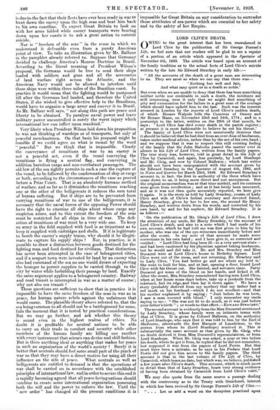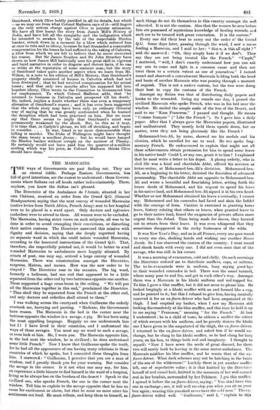LORD CLIVE'S DEATH.
OWING to the great interest that has been reawakened in Lord Clive by the publication of Sir George Forrest's Life, we feel sure that our readers will be glad to see a reprint of a portion, of an article which appeared in the Spectator of November 4th, 1893. The article was based upon an account of the family tradition as to the actual facts of Lord Clive's suicide written by the late Sir Edward Strachey in early life :-
" All the accounts of the death of a great man are interesting to us. They are most so when we can say that there was- ' Nothing but well and fair, And what may quiet us in a death so noble.'
But even when we are unable to deny that there has been something neither noble nor creditable in such a death, the incidents am -still interesting, were it only that we might find something of pity and extenuation for the failure in a great man of the courage which should have upheld him to the last. Such was the interest aroused in London by the reports of Lord Clive's sudden death, of which Horace Walpole tells the Countess of Ossory and Sir Horace Mann, on November 23rd and 24th, 1774 ; and in a postscript to the latter, written on the 29th of that month, he says : Lord Clive has died every death in the parish register ; at present it is most fashionable to believe he cut his throat.'
The family of Lord Clive were not unnaturally desirous that it should be believed that he had died from an over-dose of laudanum, taken under medical advice, rather than by the act of his own hand ; and we suppose that it was to respect this still existing feeling of tho family that Sir John Malcolm passed the matter over in silence in his Life of Lord Clive, written from the family papers. The true story was, however, told in great detail in the Life of Clive by Caraccioli, and again, less precisely, by Lord Stanhope and Mr. Gleig, and now by Colonel Malleson ; which last writer should not have been unacquainted with the account given by Sir Edward Strachey in the Spectator of August 4th, 1882, and in Notes and Queries for March 23rd, 1889. Sir Edward Strachey's account is, in fact, the first in authority of the three which have come down to us, it being more direct and not anonymous. But the original memorandum was at that time mislaid, and its contents were given from recollection ; and as it has lately been recovered, and as it was not then quite accurately reported, we here give it again. It is the story as told by Lady Strachey, cousin of Lady Clive and wife of Clive's Indian secretary and devoted friend, Henry Strachey, given by her to her eon, the second Sir Henry Strachey, and written down from his words, and corrected by his own hand, by and for his nephew, Sir Edward Strachey. It is as follows :— On the publication of Mr. Gleig's Life of Lord Clive, I drew the attention of my uncle, Sir Henry Strachey, to the account of Lord Clive's death, and also to a note which I had made of his own account, which he had told me was first given to him by his mother, who was one of the eye-witnesses immediately before and after the event. In my note of that account he made some corrections in his own hand ; and I here give it, so corrected and verified : " Lord Clive had long been ill—in a very nervous state— and had been cautioned by his physician against taking laudanum, but he would and did take it. Mr. and Mrs. Strachey and Miss Ducarrel were at Lord Clive's house in Berkeley Square. Lord Clive went out of the room, and not returning, Mr. Strachey said to Lady Clive, ' You had better go and see where my lord is.' She went to look for him, and at last, opening a door, found Lord Clive with his throat cut. She fainted, and servants came. Patty Ducarrel got some of the blood on her hands, and licked it off. After the event, Mrs. Strachey remembered having seen Lord Clive, when at her house some days before, take up a penknife from the inkstand, feel its edge, and then lay it down again." We have a story (probably derived from my mother) that my father had a red mark on his forehead—which I do not recollect—and that his mother explained it by saying : " Just before he was born, I saw a man covered with blood." I only remember my uncle saying to me : " She was not fit to do much, as it was just before your father's birth " ; or words to that effect.—EDWARD STRACHEY.'
The second account is evidently from the Miss Ducarrel mentioned by Lady Strachey, whose family were on intimate terms with that of Clive. It is given by Colonel Malleson, on the authority of Lord Stanhope, who says that it was told to him by the Earl of Shelburne, afterwards the first Marquis of Lansdowne, to the person from whom he (Lord Stanhope) received it. This is substantially the same account as that given by Mr. Gleig, who no doubt derived it from Miss Ducarrel's representatives, or from Lord Stanhope. When Mr. Gleig was asked, a year or two before his death, where he got it from, he replied that ho did not remember, but supposed it was from the papers of Lord Fowls. But thin must have been a mistake, as he says in his Preface that Lord Powis did not give him access to the family papers. The third account is that in the last volume of The Life of Clive, by Caraccioli, which bears no date, but which was, we believe, published a few years after Clive's death. This account, which is much more in detail than that of Lady Strachey, bears very strong evidence of having been obtained by Caraccioli from Lord Clive's valet."
We may also quote from the same source a passage dealing with the controversy as to the Treaty with Omichund, interest in which has been revived by Sir George Forrest's Lile of Olive:- " . . Let us add a word on the deception practised upan Omichund, which Clive boldly justified in. all its details, but which —as we may see from what Colonel Malleson says of it—still lingers as the only serious charge against Clive in popular estimation. We have all first learnt the story from James Mill's Hietory of India, and have felt all the sympathy and the indignation which ho intended to awaken by the tale of the respectable Hindoo banker, struck down in a moment by a blow which reduced him at once to ruin and to idiocy, because he had demanded a reasonable compensation for the losses he had suffered in the taking of Calcutta, a blow from which we are left to believe that he never recovered his reason. But Sir James Stephen and Sir John Strachey have shown us how James Mill habitually uses his great skill in vigorous and lucid narrative in order to disguise and distort facts, if he can so strike at the reputation of some eminent man ; but the story of Omichund takes quite another aspect when we learn from Mr. Wilson, in a note to his edition of Mill's History, that Omichund's property chiefly consisted of houses in Calcutta which had not been destroyed ; that he had received compensation for his actual losses ; and that only two months after his supposed fall into hopeless idiocy, Clive wrote to the Committee to recommend him for employment. To which Colonel Malleson adds, that ` he returned to business in Calcutta and prospered till his death.' He, indeed, implies a doubt whether there was even a temporary alienation of Omichund's reason ; and it has even been suggested that the whole story may have been only an ordinary Oriental way of saying that he was greatly confounded when he learned the deception which had been practised on him. But we must say that Orme seems to imply that Omichund's mind was permanently weakened by the shock. But, be this as it may, it is time that, in Carlyle's phrase, we left off shrieking, and began to consider.. . . In war, fraud is no more dishonourable than killing is murder. The Duke of Wellington might have thought . the sham treaty a needless finesse ; but he would have hanged the Hindoo banker without scruple on the morrow of Plessey. He certainly would not have paid him the quarter-of-a-million sterling which was his price, as Colonel Malleson thinks Clive should have done."



































 Previous page
Previous page